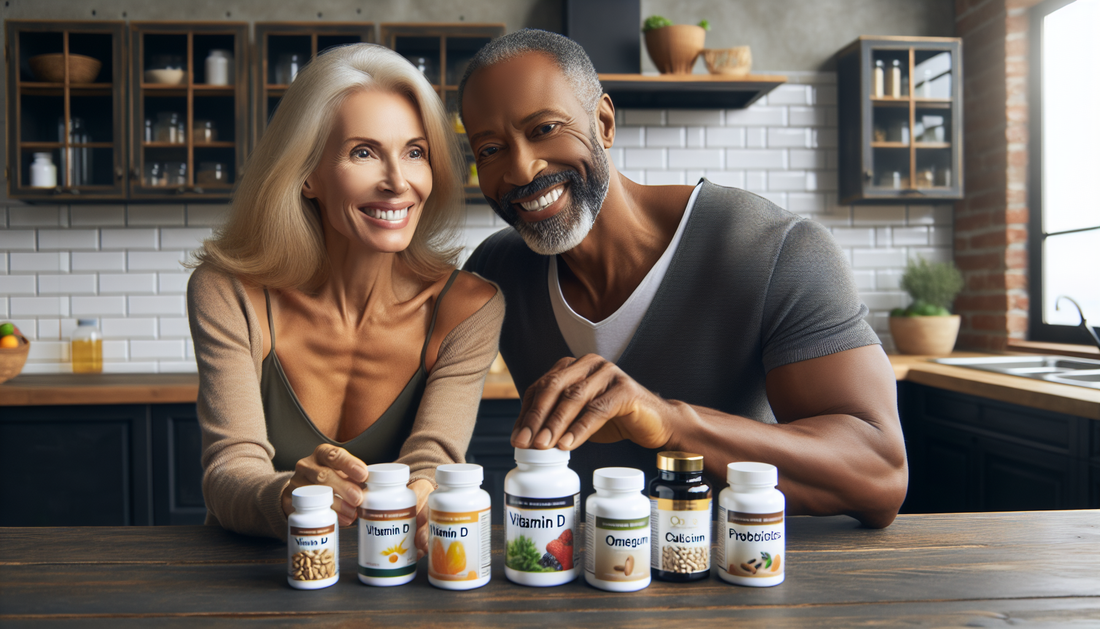
Vital Supplements to Support Health Beyond Age 50
SupplementMDbot2.4 HealthShare
As we age beyond 50, maintaining optimal health becomes increasingly essential. Including vital supplements in daily routines can significantly promote wellness and mitigate age-related health issues. Here’s a concise look at some key supplements to consider:
- Calcium and Vitamin D: Crucial for bone health, these supplements help prevent osteoporosis, especially for women. 🦴
- Omega-3 Fatty Acids: Known for supporting heart health, these are essential for maintaining cardiovascular vitality and reducing inflammation. 🫀
- B Vitamins: Vital for brain health and energy levels, B vitamins like B6, B12, and folic acid support cognitive function and overall energy. 🧠
- Magnesium: Important for muscle function and nervous system health, magnesium also aids in regulating heart rhythm and blood pressure. 💪
- Probiotics: Beneficial for gut health, they support digestion and boost the immune system, promoting overall health and wellness. 🍏
Consult with healthcare providers to tailor these supplements according to individual needs and ensure compatibility with existing health conditions. Prioritizing supplemental nutrition can lead to a vibrant and healthy lifestyle beyond age 50!
As we navigate life beyond 50, maintaining health becomes paramount. With age, the body's needs evolve, often requiring additional nutritional support. It's a journey many embark upon, seeking guidance from experts and personal experiences. Various supplements play a significant role in this phase, addressing deficiencies and promoting overall wellness. This exploration entails understanding which supplements are most beneficial and how they fit into a balanced lifestyle.
Before diving into the supplements specifically recommended after 50, it's essential to grasp why they are necessary. The body's ability to absorb certain nutrients diminishes with age. Bone density decreases, making calcium and vitamin D critical for maintaining bone health. Additionally, cognitive function may decline, prompting the need for omega-3 fatty acids. Heart health also takes precedence, with supplements like CoQ10 and magnesium playing vital roles.
Choosing the right supplements requires considering individual nutritional needs, which can significantly vary. Consulting with healthcare professionals is advisable to establish which supplements offer the most benefit and in what doses. This personalized approach ensures that the supplement regimen supports health goals without unnecessary or excessive intake.
Essential Supplements for Bone Health After 50
As individuals age, maintaining bone health becomes increasingly important. Calcium and vitamin D are often highlighted as essential for preventing osteoporosis. Calcium strengthens bones, while vitamin D enhances calcium absorption and bone growth. The National Osteoporosis Foundation recommends adults over 50 should intake 1,200 mg of calcium and 800-1,000 IU of vitamin D daily. The choice of calcium supplements, including calcium carbonate and calcium citrate, depends on individual preferences and digestive tolerance.
Boosting Cognitive Function with Omega-3 Fatty Acids
The role of omega-3 fatty acids in enhancing brain health is widely recognized. With age, cognitive functions may decline, leading to conditions like Alzheimer's disease. Omega-3 supplements, especially those containing DHA and EPA, contribute to maintaining healthy brain cell membranes. Research suggests that these acids can potentially slow cognitive decline, making them a beneficial addition to the diet of those over 50. Consuming fish oil supplements or incorporating fatty fish such as salmon and mackerel into meals can provide these vital nutrients.
The Importance of CoQ10 and Magnesium
Heart health is crucial as we age, and supplements like CoQ10 and magnesium can support cardiovascular function. CoQ10, a natural antioxidant in the body, helps produce energy and protect cells from damage. However, its levels may drop with age. Supplementation can support energy levels and heart health. Similarly, magnesium is vital for numerous bodily functions, including regulating heartbeat and supporting muscle and nerve function. It is recommended to maintain adequate levels either through diet or supplements.
Probiotics for Digestive Health
Digestive issues often arise with aging, with changes in gut bacteria influencing overall health. Probiotics can support a balanced gut microbiome, aiding digestion and enhancing immune responses. Probiotic supplements contain beneficial bacteria that can replenish gut flora and counteract digestive discomfort. While yogurt and fermented foods naturally contain probiotics, supplements with various strains may offer a more comprehensive approach to maintaining gut health.
Finding the Right Balance in Supplement Intake
It is critical to achieve balance when incorporating supplements into a daily routine. Over-supplementation can lead to adverse effects, emphasizing the importance of professional guidance. Regular health assessments can help track improvements and adjust supplements as needed. Ultimately, supplements are valuable tools for enhancing health after 50, but they work best alongside a healthy diet and regular exercise.
In conclusion, as the body's needs evolve with age, so should the approach to nutrition. Supplements tailored to an individual's needs can significantly impact overall health and well-being. From promoting bone, brain, and heart health to supporting digestion, supplements are allies in the journey towards a healthy and active aging process.











